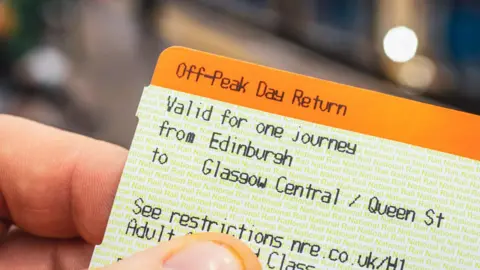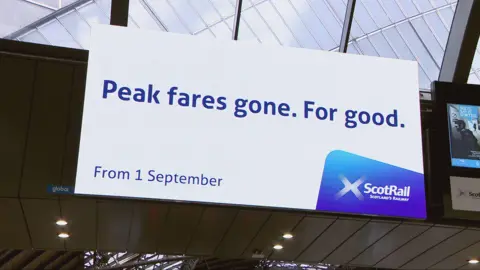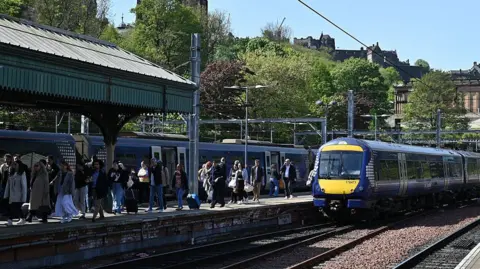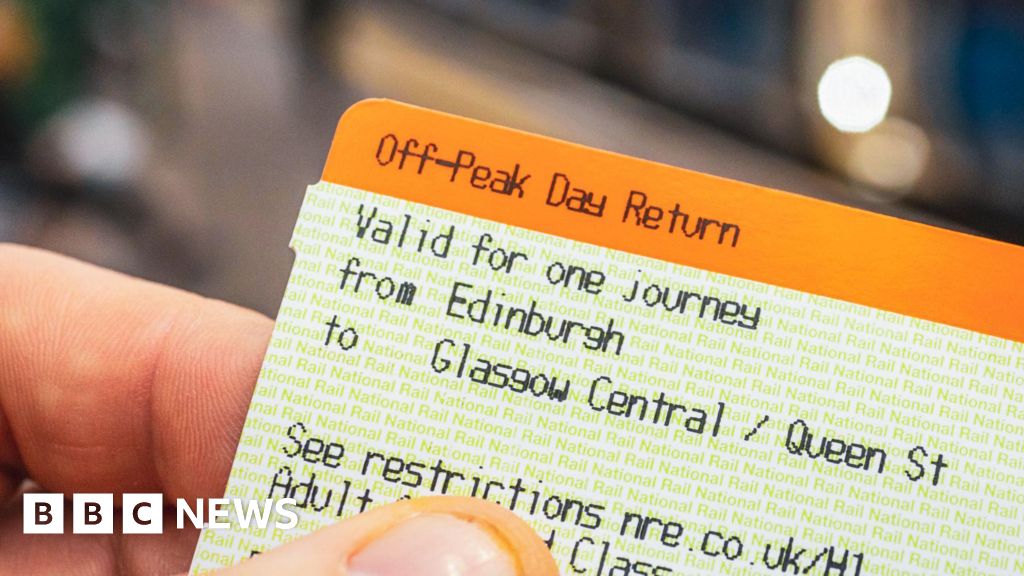Debbie JacksonBBC Scotland News
 Getty Images
Getty ImagesPeak rail fares have been scrapped on ScotRail trains, meaning passengers will no longer pay higher prices for travelling on busy weekday trains.
Until now, many ScotRail tickets were based on the time of travel. Edinburgh to Glasgow peak times will be almost 50% cheaper, with trips between Perth and Dundee a third lower.
The Scottish government-owned operator said its aim was to get more commuters out of cars and onto trains.
Season tickets and fares on routes with peak time prices are unchanged. Multi-journey flexipass tickets have been adjusted with smaller savings.
Peak ScotRail fares used to cover tickets bought for travel before 09:15 on weekdays and certain services between 16:42 and 18:30.
A pilot scheme scrapping peak-time fares, a policy championed by the Scottish Greens, was introduced in 2023 but ended in September 2024 after ministers said the costs of the subsidy could not be justified.
However, in his programme for government speech in May, First Minister John Swinney announced that peak fares would again be scrapped.
Speaking at the launch of the scheme in Edinburgh on Monday, he said it would help people to move “from their cars onto trains”, which would provide environmental benefits.
He added: “This is financially sustainable because it’s an investment in the rail network and it’s an investment in the people of Scotland.
“People in Scotland simply travelling from Edinburgh to Glasgow on a daily basis will see their travel costs fall by almost 50%. That’s a massive saving when people are struggling financially.”
ScotRail ticketing will also be more straightforward and flexible under the new system, the firm has said.
How is scrapping peak fares being paid for?

ScotRail has been owned and run by the Scottish government since 2022.
In October 2023 the rail firm started a year-long trial of scrapping peak fares with the aim of persuading more people to swap car journeys for rail travel.
Last year, Scottish ministers announced the trial had “limited success” and would not be extended.
An evaluation of the first nine months of the trial found passenger levels increased by a maximum of about 6.8%.
This represented around four million extra rail journeys, of which two million are journeys that would previously have been made by private car.
However, the scheme required a 10% rise to be self-financing.
Scotland’s Transport Secretary Fiona Hyslop also said at the time that the pilot “primarily benefited existing train passengers and those with medium to higher incomes”.
The evaluation found the estimated cost of the scheme was “in the annual range of £25m to £30m per annum (in 2024 prices) with the possibility of being as large as £40m”.
Swinney said he expected the annual cost to be between £40m to £45m each year and lead to a “huge saving” for individuals.
If the new scheme does not become self-financing through an increase in passenger numbers, the costs will be met from the ScotRail budget.
This is made up of revenue from passenger fares and the £1.6bn the Scottish government puts into rail services every year.
Joanne Maguire, managing director at ScotRail told BBC Scotland News: “We are really excited at the opportunity to get more customers out of their cars and onto the railway.
“If you are travelling from Edinburgh to Glasgow you will see a saving of about 50%.
“From Inverkeithing to Edinburgh, you will save 40% and between Inverness and Elgin it is 35% – so it’s great news for our passengers.”
Ms Maguire said the trial period had seen an increase in passenger numbers and that ScotRail had enjoyed a successful summer of moving customers around to numerous big leisure events.
She added that the goal now was to grow the commuter passenger base.
 Getty Images
Getty ImagesSeveral passengers at Glasgow’s Queen Street station told BBC Scotland News they were unaware that peak time fares had been dropped – but welcomed the move.
Student Robbie McCormack said: “I commute every day for college and it’s quite expensive.
“I’ll be able to save throughout the week, save more college money and get something else for lunch.”
Passenger Tommy Whitelaw travels across Scotland giving talks to charities and care homes.
He said the end of peak fares removed the limits on when many people could travel.
He added: “It makes a difference to everybody, its our duty to make everything achievable for people.
“The cost of living shrinks our world, this is one way to open it up a wee bit.”
‘Deeply unfair tax’
Susan Watts, from Leeds, told BBC Your Voice that peak fares should be scrapped UK-wide.
She said: “Our complicated fare system is enough to put anyone off using trains.
“In Italy, I paid the same price for a ticket when I turned up an hour before as if I’d booked months earlier – the price is just the price.”
Green MSP Mark Ruskell said peak rail fares were a “deeply unfair tax” on people who had no say over when they needed to travel.
“I am delighted that we are finally rid of them,” he said.
“I’m glad that the Scottish government has finally listened to the Greens, the trade unions and the rail users who were responsible for securing the initial pilot.”



